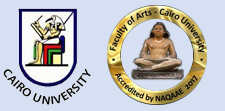عنوان المقال عربي
دراسة التکامل بين الإيمانية والمنهجية في قراءة آيات الوحى القرآنى وآثار هذا التکامل بين المسلمين
Document Type
Book Review
كلمات مفتاحية عربي
النص القرآني, الإيمانية, المنهجية العلمية, التراكمية, الموسوعية, التجريبية, الإسناد, التدوين, الشك المنهجي
Abstract English
This study deals with analyzing the mind exploration of the Quranic text semantics. Quranic text leads the spirit to faith, and the mind to the methodology of thinking. Every reading of the Quranic text brings a new understanding, and the first principle that establishes the understanding of Islam is based on the reading of revelation. There is nothing to support the religion better than paying attention to the texts of revelation, its verses, words, meanings, and particulars. The attempt of mind to understand the Quranic text, perhaps gives its owner an opinion, it may enable him to build up his thoughts which will eventually lead him to the conception of science, or it may lead him directly to science. Besides, the Quranic text might direct the reader to specialize in science. Muslims have presented an accurate scientific performance in their first experience in recordation, which began since the era of prophecy represented in the writing of Revelation and the holy Quran. They have also given the utmost importance to the medium in which a scientist grew and its impact on determining the credibility of his knowledge. This has led historians to allot full chapters to state the traits by which the scientist must be distinguished, which mostly focused on the mental, moral and behavioral traits, because the discipline and justice balance in science is the core meaning of the "scientific spirit" of which contemporary science is proud. The scientific spirit of Muslim scholars was not just a theoretical effort, since it has enabled them of science applications. The most distinctive achievement of Muslims is the experimental mind, as they have realized the relationship between text and reality, what led them to come to empiricism that can be called "Islamic empiricism". They have used induction, employed the historical and critical approaches, explicitly identified an approach for comparison, which they termed " Moqaysa " ( i.e comparison) , established the method of " systematic uncertainty ", which is a scientific method, and specified its rules, and introductions. Their finest findings in the field of science was " Isnad " (support), which is of no less value or impact than " empiricism " in science, until Isnad has become an autonomous science. Muslims innovations were widespread in all branches of science, which is an indication of encyclopedic scientists and their vast effort, exerted in all fields of science thanks to their reading of the texts of revelation.
الملخص العربي
إنّ محاولة العقل لفهم النصّ القرآني، ربّما تهب صاحبها رأياً؛ أي فهماً ما لدلالة النصّ، وربّما مكّنت صاحبها من بناء أفكاره في قضية معينة، وربّما أوصلته إلى العلم، أو وجّهته إلى أن يختصّ بشأن من العلم دون غيره، وظهر ذلك في الصحابة رضي الله عنهم؛ حيث اختصّ كلّ منهم بنوع من العلم، ولا ينبغي أن يقتصر فهمنا من تلاوة النصوص على الدلالة المباشرة للكلمة؛ من قراءة للتعبّد وحسب، بل ينبغي تجاوزها إلى العمل بمقتضاها في إبداعات العلم والنُظم والمعاملات. قدم المسلمون أداءً علميّاً دقيقاً في تجربتهم الأولى في التدوين الذي بدأ منذ عهد النبوة متمثّلاً في كتابة الوحي، وقد أوْلَوْا أهميّة قصوى للمنبت الذي ينشأ فيه العالم وأثر ذلك في مصداقيّة علمه، وعقد المؤرّخون فصولاً في بيان الخصال التي يجب أن ينالها العالم انصبّ أغلبُها على النفسيّة والأخلاقيّة منها، لأنّ ميزان الضبطْ والعدالة في العلم هو ما تعنيه "الروح العلمية" التي يفخر بها العلم المعاصر، ولم تكن الروح العلمية التي تحلّى بها علماء الإسلام جهداً نظريّاً وحسب، فإنّ هذه الروح قد مكّنتهم من تطبيقات العلم، وأوّلها اهتمامهم بتحديد المفاهيم والمصطلحات في كافة فروع العلم. ويظل النصّ القرآني محفّزاً للفكر، والفكر هو الموجه الأول للسلوك، وأميز ما مكّنه من ذلك هو "العقل التجريبي"، فقد أدرك المسلمون قوة العلاقة بين النص والواقع، ما أدى إلى توصله تدريجياً إلى التجريبية التي يصح أن يُقال بأنها "تجريبية إسلامية" في تأسيسها، استخدموا الاستقراء، واستعانوا بالمنهج التاريخي، والمنهج النقدي كما استعانوا بأدوات العلم، وحددوا بشكل صريح منهجاً للمقارنة، وأسموه "المقايسة". وأسسوا "الشكّ المنهجي"، طريقاً علميّا، وأفردوا قواعده، ومقدّماته، ونتائجه، وكان من أرقى ما توصّل إليه وعي المسلمين في مجال العلم هو "الإسناد" الذي لا يقلّ قيمة وأثراً عن "التجريبيّة" في العلم، حتى صار الإسناد علماً قائماً بذاته، مما جعله البعض علماً من علوم الحديث، لما بذله علماء الأمّة في سبيل حفظ الحديث، كما شاعت إبداعات المسلمين في كلّ صنوف العلم مما دل على موسوعية العلماء واتساع جهدهم العلمي في كافة مجالات العلم، وما كان للعقل المسلم أن ينال هذا الحظّ من "منهجيّة العلم" إلا بأثر من قراءة الوحي.
Recommended Citation
Sabry, Hussein
(2019)
"A study of the integration between faith and methodology in reading the verses of the Qur’anic revelation and the effects of this integration among Muslims,"
Journal of the Faculty of Arts (JFA): Vol. 79:
Iss.
3, Article 7.
DOI: https://doi.org/10.21608/jarts.2019.81687
Digital Object Identifier (DOI)
10.21608/jarts.2019.81687
Accept Date
2018-04-11
Publication Date
7-1-2019

